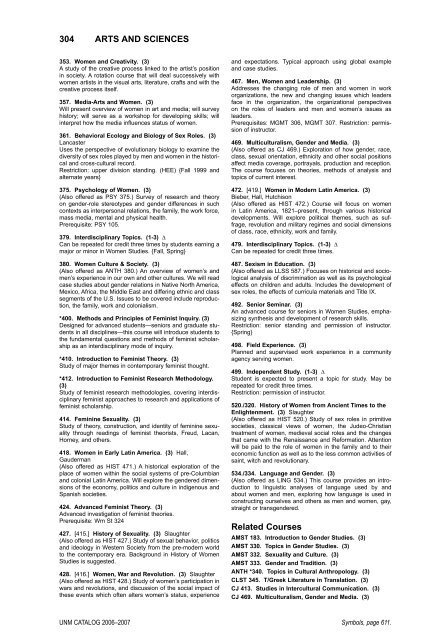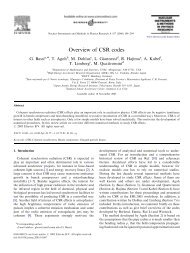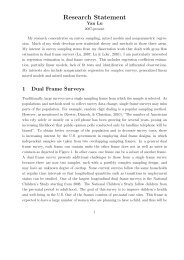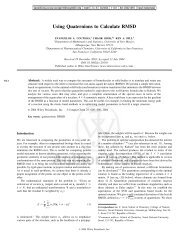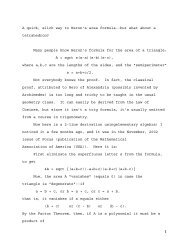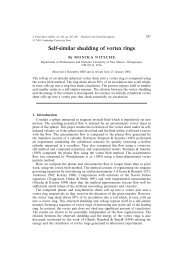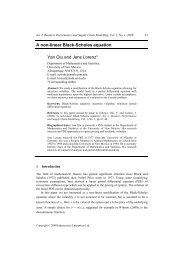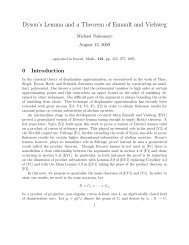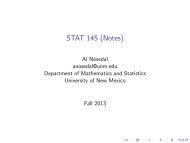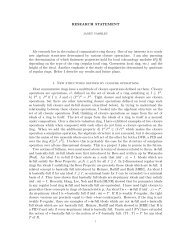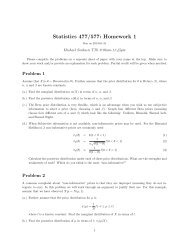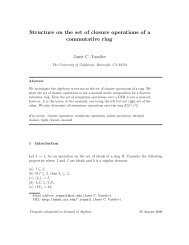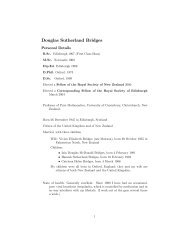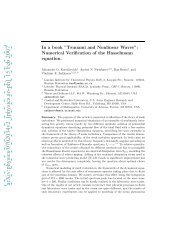OEO Office of Equal Opportunity - Department of Mathematics and ...
OEO Office of Equal Opportunity - Department of Mathematics and ...
OEO Office of Equal Opportunity - Department of Mathematics and ...
Create successful ePaper yourself
Turn your PDF publications into a flip-book with our unique Google optimized e-Paper software.
304 ARTS AND SCIENCES<br />
353. Women <strong>and</strong> Creativity. (3)<br />
A study <strong>of</strong> the creative process linked to the artist’s position<br />
in society. A rotation course that will deal successively with<br />
women artists in the visual arts, literature, crafts <strong>and</strong> with the<br />
creative process itself.<br />
357. Media-Arts <strong>and</strong> Women. (3)<br />
Will present overview <strong>of</strong> women in art <strong>and</strong> media; will survey<br />
history; will serve as a workshop for developing skills; will<br />
interpret how the media influences status <strong>of</strong> women.<br />
361. Behavioral Ecology <strong>and</strong> Biology <strong>of</strong> Sex Roles. (3)<br />
Lancaster<br />
Uses the perspective <strong>of</strong> evolutionary biology to examine the<br />
diversity <strong>of</strong> sex roles played by men <strong>and</strong> women in the historical<br />
<strong>and</strong> cross-cultural record.<br />
Restriction: upper division st<strong>and</strong>ing. (HEE) {Fall 1999 <strong>and</strong><br />
alternate years}<br />
375. Psychology <strong>of</strong> Women. (3)<br />
(Also <strong>of</strong>fered as PSY 375.) Survey <strong>of</strong> research <strong>and</strong> theory<br />
on gender-role stereotypes <strong>and</strong> gender differences in such<br />
contexts as interpersonal relations, the family, the work force,<br />
mass media, mental <strong>and</strong> physical health.<br />
Prerequisite: PSY 105.<br />
379. Interdisciplinary Topics. (1-3) ∆<br />
Can be repeated for credit three times by students earning a<br />
major or minor in Women Studies. {Fall, Spring}<br />
380. Women Culture & Society. (3)<br />
(Also <strong>of</strong>fered as ANTH 380.) An overview <strong>of</strong> women’s <strong>and</strong><br />
men’s experience in our own <strong>and</strong> other cultures. We will read<br />
case studies about gender relations in Native North America,<br />
Mexico, Africa, the Middle East <strong>and</strong> differing ethnic <strong>and</strong> class<br />
segments <strong>of</strong> the U.S. Issues to be covered include reproduction,<br />
the family, work <strong>and</strong> colonialism.<br />
*400. Methods <strong>and</strong> Principles <strong>of</strong> Feminist Inquiry. (3)<br />
Designed for advanced students—seniors <strong>and</strong> graduate students<br />
in all disciplines—this course will introduce students to<br />
the fundamental questions <strong>and</strong> methods <strong>of</strong> feminist scholarship<br />
as an interdisciplinary mode <strong>of</strong> inquiry.<br />
*410. Introduction to Feminist Theory. (3)<br />
Study <strong>of</strong> major themes in contemporary feminist thought.<br />
*412. Introduction to Feminist Research Methodology.<br />
(3)<br />
Study <strong>of</strong> feminist research methodologies, covering interdisciplinary<br />
feminist approaches to research <strong>and</strong> applications <strong>of</strong><br />
feminist scholarship.<br />
414. Feminine Sexuality. (3)<br />
Study <strong>of</strong> theory, construction, <strong>and</strong> identity <strong>of</strong> feminine sexuality<br />
through readings <strong>of</strong> feminist theorists, Freud, Lacan,<br />
Horney, <strong>and</strong> others.<br />
418. Women in Early Latin America. (3) Hall,<br />
Gauderman<br />
(Also <strong>of</strong>fered as HIST 471.) A historical exploration <strong>of</strong> the<br />
place <strong>of</strong> women within the social systems <strong>of</strong> pre-Columbian<br />
<strong>and</strong> colonial Latin America. Will explore the gendered dimensions<br />
<strong>of</strong> the economy, politics <strong>and</strong> culture in indigenous <strong>and</strong><br />
Spanish societies.<br />
424. Advanced Feminist Theory. (3)<br />
Advanced investigation <strong>of</strong> feminist theories.<br />
Prerequisite: Wm St 324<br />
427. [415.] History <strong>of</strong> Sexuality. (3) Slaughter<br />
(Also <strong>of</strong>fered as HIST 427.) Study <strong>of</strong> sexual behavior, politics<br />
<strong>and</strong> ideology in Western Society from the pre-modern world<br />
to the contemporary era. Background in History <strong>of</strong> Women<br />
Studies is suggested.<br />
428. [416.] Women, War <strong>and</strong> Revolution. (3) Slaughter<br />
(Also <strong>of</strong>fered as HIST 428.) Study <strong>of</strong> women’s participation in<br />
wars <strong>and</strong> revolutions, <strong>and</strong> discussion <strong>of</strong> the social impact <strong>of</strong><br />
these events which <strong>of</strong>ten alters women’s status, experience<br />
<strong>and</strong> expectations. Typical approach using global example<br />
<strong>and</strong> case studies.<br />
467. Men, Women <strong>and</strong> Leadership. (3)<br />
Addresses the changing role <strong>of</strong> men <strong>and</strong> women in work<br />
organizations, the new <strong>and</strong> changing issues which leaders<br />
face in the organization, the organizational perspectives<br />
on the roles <strong>of</strong> leaders <strong>and</strong> men <strong>and</strong> women’s issues as<br />
leaders.<br />
Prerequisites: MGMT 306, MGMT 307. Restriction: permission<br />
<strong>of</strong> instructor.<br />
469. Multiculturalism, Gender <strong>and</strong> Media. (3)<br />
(Also <strong>of</strong>fered as CJ 469.) Exploration <strong>of</strong> how gender, race,<br />
class, sexual orientation, ethnicity <strong>and</strong> other social positions<br />
affect media coverage, portrayals, production <strong>and</strong> reception.<br />
The course focuses on theories, methods <strong>of</strong> analysis <strong>and</strong><br />
topics <strong>of</strong> current interest.<br />
472. [419.] Women in Modern Latin America. (3)<br />
Bieber, Hall, Hutchison<br />
(Also <strong>of</strong>fered as HIST 472.) Course will focus on women<br />
in Latin America, 1821–present, through various historical<br />
developments. Will explore political themes, such as suffrage,<br />
revolution <strong>and</strong> military regimes <strong>and</strong> social dimensions<br />
<strong>of</strong> class, race, ethnicity, work <strong>and</strong> family.<br />
479. Interdisciplinary Topics. (1-3) ∆<br />
Can be repeated for credit three times.<br />
487. Sexism in Education. (3)<br />
(Also <strong>of</strong>fered as LLSS 587.) Focuses on historical <strong>and</strong> sociological<br />
analysis <strong>of</strong> discrimination as well as its psychological<br />
effects on children <strong>and</strong> adults. Includes the development <strong>of</strong><br />
sex roles, the effects <strong>of</strong> curricula materials <strong>and</strong> Title IX.<br />
492. Senior Seminar. (3)<br />
An advanced course for seniors in Women Studies, emphasizing<br />
synthesis <strong>and</strong> development <strong>of</strong> research skills.<br />
Restriction: senior st<strong>and</strong>ing <strong>and</strong> permission <strong>of</strong> instructor.<br />
{Spring}<br />
498. Field Experience. (3)<br />
Planned <strong>and</strong> supervised work experience in a community<br />
agency serving women.<br />
499. Independent Study. (1-3) ∆<br />
Student is expected to present a topic for study. May be<br />
repeated for credit three times.<br />
Restriction: permission <strong>of</strong> instructor.<br />
520./320. History <strong>of</strong> Women from Ancient Times to the<br />
Enlightenment. (3) Slaughter<br />
(Also <strong>of</strong>fered as HIST 520.) Study <strong>of</strong> sex roles in primitive<br />
societies, classical views <strong>of</strong> women, the Judeo-Christian<br />
treatment <strong>of</strong> women, medieval social roles <strong>and</strong> the changes<br />
that came with the Renaissance <strong>and</strong> Reformation. Attention<br />
will be paid to the role <strong>of</strong> women in the family <strong>and</strong> to their<br />
economic function as well as to the less common activities <strong>of</strong><br />
saint, witch <strong>and</strong> revolutionary.<br />
534./334. Language <strong>and</strong> Gender. (3)<br />
(Also <strong>of</strong>fered as LING 534.) This course provides an introduction<br />
to linguistic analyses <strong>of</strong> language used by <strong>and</strong><br />
about women <strong>and</strong> men, exploring how language is used in<br />
constructing ourselves <strong>and</strong> others as men <strong>and</strong> women, gay,<br />
straight or transgendered.<br />
Related Courses<br />
AMST 183. Introduction to Gender Studies. (3)<br />
AMST 330. Topics in Gender Studies. (3)<br />
AMST 332. Sexuality <strong>and</strong> Culture. (3)<br />
AMST 333. Gender <strong>and</strong> Tradition. (3)<br />
ANTH *340. Topics in Cultural Anthropology. (3)<br />
CLST 345. T/Greek Literature in Translation. (3)<br />
CJ 413. Studies in Intercultural Communication. (3)<br />
CJ 469. Multiculturalism, Gender <strong>and</strong> Media. (3)<br />
UNM CATALOG 2006–2007 Symbols, page 611.


